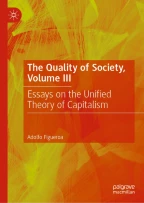Fiscal Policy and Income Inequality

Do governments seek to redistribute income through fiscal policy? Do they have the incentives? The answers are not settled in the economic literature (Lustig in Commitment to equity handbook: Estimating the impact of fiscal policy on income inequality and poverty, Brookings Institution Press, 2018). This essay analyzes this question through a model of unified theory of capitalism (UTC). Given the complexity of the problem at hand, the final model will be presented step by step, through two intermediate models.
This is a preview of subscription content, log in via an institution to check access.
Access this chapter
Subscribe and save
Springer+ Basic
€32.70 /Month
- Get 10 units per month
- Download Article/Chapter or eBook
- 1 Unit = 1 Article or 1 Chapter
- Cancel anytime
Buy Now
Price includes VAT (France)
eBook EUR 106.99 Price includes VAT (France)
Hardcover Book EUR 137.14 Price includes VAT (France)
Tax calculation will be finalised at checkout
Purchases are for personal use only
References
- Acemoglu, D., Naidu, S., Restrepo, P., & Robinson, J. (2015). Democracy, redistribution, and inequality. In A. B. Atkinson & F. Bourguignon (Eds.), Handbook of income distribution (Vol. 2, pp. 1885–1966). Elsevier. Google Scholar
- Clements, B., de Mooij, R., Gupta, S., & Keen, M. (Eds.). (2015). Inequality and fiscal policy. International Monetary Fund. Google Scholar
- Figueroa, A. (2015). Growth, employment, inequality, and the environment: Consilience in economics (Vols. 1 & II). Palgrave Macmillan. Google Scholar
- Lustig, N. (Ed.). (2018). Commitment to equity handbook: Estimating the impact of fiscal policy on income inequality and poverty. Brookings Institution Press. Google Scholar
- Tax Foundation. (2022). Sources of government revenue in OECD 2021. Accessed 10 Feb 2022. https://taxfoundation.org/publications/
Author information
Authors and Affiliations
- Pontifical Catholic University of Peru, Lima, Peru Adolfo Figueroa
- Adolfo Figueroa
You can also search for this author in PubMed Google Scholar
Corresponding author
Rights and permissions
Copyright information
© 2023 The Author(s), under exclusive license to Springer Nature Switzerland AG
About this chapter
Cite this chapter
Figueroa, A. (2023). Fiscal Policy and Income Inequality. In: The Quality of Society, Volume III. Palgrave Macmillan, Cham. https://doi.org/10.1007/978-3-031-21072-3_6
Download citation
- DOI : https://doi.org/10.1007/978-3-031-21072-3_6
- Published : 30 October 2023
- Publisher Name : Palgrave Macmillan, Cham
- Print ISBN : 978-3-031-21071-6
- Online ISBN : 978-3-031-21072-3
- eBook Packages : Economics and FinanceEconomics and Finance (R0)
Share this chapter
Anyone you share the following link with will be able to read this content:
Get shareable link
Sorry, a shareable link is not currently available for this article.
Copy to clipboard
Provided by the Springer Nature SharedIt content-sharing initiative

